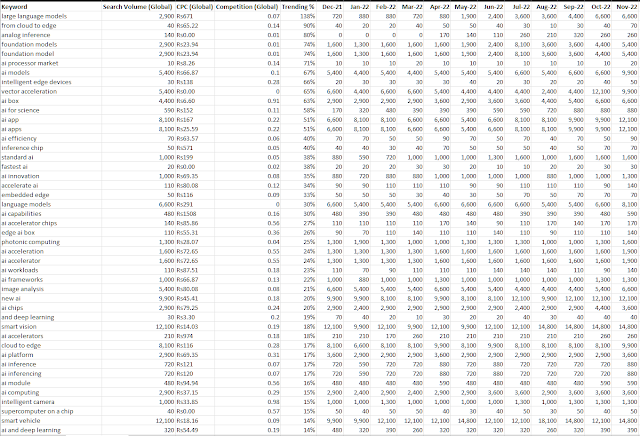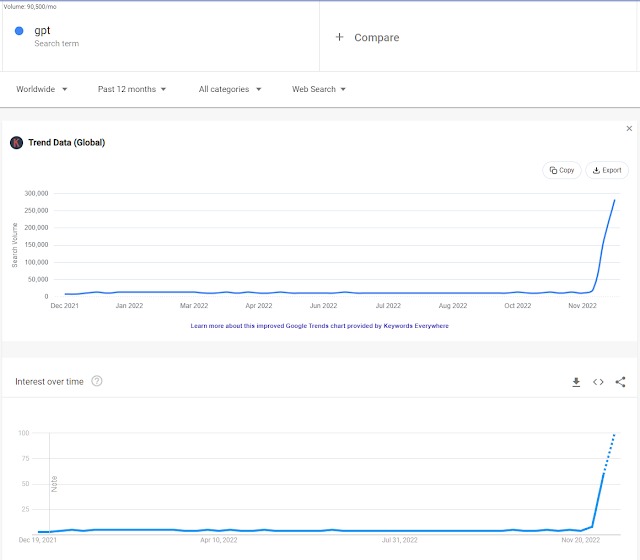State of SEO for AI Chip Companies
In a previous blog, we explored whether lack of SEO may have contributed to the demise of Mythic, an AI chip company. As an academic outbound marketing exercise, let's look at how other hot AI chip startups are fairing in their SEO efforts.
First thing to do is identify the top AI chip companies that we are going to look at. That's simple enough - just a Google search for top AI chip startups yields us multiple results. The first link lists companies by the amount of funding raised, although the data appears to be slightly dated, which is fine for the purposes of this blog.
- SambaNova
- Cerebras
- GraphCore
- Nuvia [Now Qualcomm hence ignoring]
- Hailo
- Wave Computing [Filed for bankruptcy protection hence ignoring]
- Cambricon [This is Chinese company and we will ignore as the data may not be accurate]
- Kneron
- Sima.ai
- Esperanto
- Luminous
- LightMatter
Next, we will do a keyword density analysis of the home pages of these websites using our favorite Keywords Everywhere tool. The idea is that by analyzing the homepages of these companies for keyword densities, we will be able to find the keywords that these businesses are focusing on. This also gives us additional keywords to add to our master AI chip company keyword spreadsheet. Please reach out to me if you want to get access to this list. Below is a screenshot of the top trending keywords in the list.
Please note that I have removed all keywords such as, say datacenter or innovation or compute fabric, that have high search volumes but are very difficult to optimize for, as well as the ones that have zero search volumes. We will also remove all proprietary keywords such as ipu and npu from this list.
Let's start looking at the top keyword by density for each of these companies and the respective SERPs on semrush.
- SambaNova's top keyword is deep learning with a density of 1.43% and its website does not appear in the top 10 results. They would be better off targeting keywords such as ai models or language models as they are starting to trend significantly.
- Cerebras' top keyword is language models with a density of .52% and its website does not appear in the top 10 results. That said, they have chosen a very good keyword - variations such as large language models or ai models are trending extremely well. They need to create new content with higher keyword densities to start an upward progression in rankings.
- GraphCore's top keyword is machine learning with a density of .98% and its website does not appear in the top 10 results. It's a very difficult keyword to optimize for given the incredible amount of material on the internet around this topic. It would be much better to optimize for different keywords that fit its business objectives.
- Hailo's top keyword is either edge ai or edge ai box with a density of 2.56%. While its website does not appear in the top 10 results for edge ai, it is second for edge ai box. There's a massive difference in the search volumes between these two keywords, but edge ai box is trending and Hailo may have made a good choice as it's targeting highly specific searchers.
- Kneron's top keyword is also edge ai with a density of 2.24% and its website does not appear in the top 10 results. As we have seen, it's a difficult word to optimize for. They would be better off focusing on edge ai box or similar the way Hailo is doing.
- Sima.ai's top keywords are either industry 4.0 or smart vision with a density of 3.87% and its website does not appear in the top 10 results as expected. Competition for both these keywords is very strong. Considering that they are pitching a system solution, keywords that highlight their vertical markets may be more applicable.
- Esperanto's top keyword is cloud to edge with a density of .69% and its website does not appear in the top 10 results either. Some of their keywords choices are fairly decent, but the content is very light. You have to give the search engines a much larger opportunity to find you.
- Luminous has only one keyword, ai supercomputer, with a density of 1.5% and it is nowhere near the top 10. Luminous is really very light on content. Perhaps, they plan to add more later.
- Lightmatter's top keyword is photonic computing with a keyword density of 1.02% and is actually very very close to the top 10. Either by design or luck, they have chosen a keyword that does have some search volume, but with little competition.
So what's the verdict? It's the same as last time. Hailo.ai seems to be the only company that has spent any time or effort on optimizing its website for search engines. Cerebras has good keywords, but needs to put in more effort on generating targeted content, and Lightmatter is showing up near the top 10 for its only keyword. Others are a work in progress in varying stages.
It's important to realize that in the quest to create really cool slick websites, you do not forget the basics of SEO and quality content.



Comments
Post a Comment